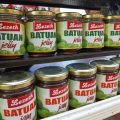It is not as popular as potato, sweet potato, or yam but Apali (Dioscorea esculenta) is a lesser yam with a great potential. “Apali” as it is called in the South of the Philippines, is also known as “Tugi” among the Tagalog. It is a climate-resilient crop that can withstand adverse climatic conditions, particularly during long dry periods. It is high in dietary fiber, has longer shelf-life, and can be an alternative staple food source that can address food security issue in the country.

This lesser yam is native to Southeast Asia and is one of the first yam species that was cultivated. It is considered as an underutilized crop that is only remembered mostly during the long period of famine when people have nothing to eat. People would rely on Apali as it is always available. It can be stored for six months. It grows in rainfed or upland and marginal lands and can be grown as a backup crop during growing seasons of rice and corn.
Depending on the variety, Apali plant can grow up to 50 cm long and can produce 5-20 tubers per plant. The stems are cylindrical, pubescent, with scattered prickles. Physically, Apali has a smaller corm than other yams, looking like a long and narrow sweet potato but occasionally it can be a spindle or branched. Its flesh, which is smooth and has no fibers, unlike most rootcrops, ranges from white to cream color.
Often served cooked either boiled or roasted, Apali is high in Vitamin C, dietary fiber, Vitamin B6, potassium, and manganese. It is low in saturated fat and sodium and promotes good healthy balance in human body against osteoporosis and heart disease.
Apali is minimally cultivated in the country either due to lack of awareness of the crop or due to its unexplored economic potentials as fresh and processed foods.
Given the great potential of Apali, the Agriculture-Regional Field Office (DA-RFO) 11 embarked on a three-year study titled, “Collection, Evaluation and Identification of Apali Cultivars Suitable for Food Processing in Region XI”. Funded by the Bureau of Agricultural Research (BAR), the study aimed to increase the supply of Apali, identify the best variety that has long shelf life and best for processing, and develop Apali package of technology that the farmers can easily adapt. With the increased supply of Apali production, is also exploring the various product development initiatives that can be derived from indigenous crop.
According to Jorgea C. Galindo, researcher from Department of Agriculture-Regional Field Office (DA-RFO) 11 who is also the project leader, Apali can be found in the tropical forest in the Philippines and is considered as an indigenous rootcrop that can substitute rice and corn. It can be processed into various products including cue, boiled, sweetened, jams, candies, and vegetable mixed or stewed with meat.
Due to its potato-like characteristics, Apali can also be sliced or diced and boiled or fried like chips or fries. In fact, the DA-RFO 11 has recently come up with the Pinoy version of French fries, using Apali. Dubbed as the “Apali Pinoy fries” it was found to taste very similar with that of French fries in terms of texture and appearance. The taste was found to be acceptable among those who have tried it during trade fairs and exhibits.
The project enabled DA-RFO 11 to produce Apali flour and various Apali-flour based products including cookies, crinkles, and munchkins. These products won the “Best Products Award” during the recently concluded “13th Agriculture and Fisheries Technology Forum and Product Exhibition” organized by BAR. The award is annually given to product of research and development that is unique, has an appropriate packaging and labeling, possesses market potential, and is relevant to achieving food security and health and wellness. ### (Rita T. dela Cruz)
Source: http://www.bar.gov.ph






